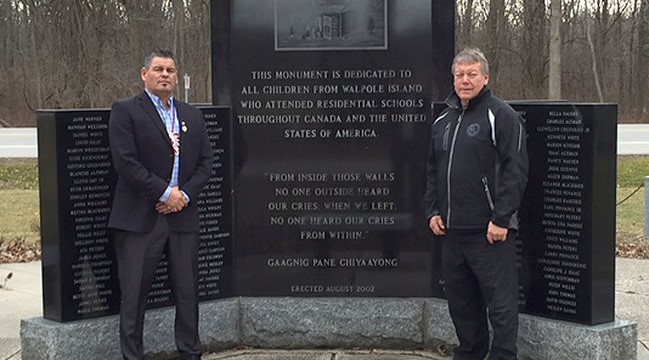Ontario Regional Chief Isadore Day is calling on all levels of government and all sectors of society to act upon the 94 Calls to Action made in the Truth and Reconciliation Commission Report released on Tuesday.
The six-volume, 25-lb report on the history and legacy of Canada’s residential school system is the most comprehensive chronicle of a painful history that continues to haunt Indigenous peoples today.
“Today’s report presents the largest challenge in Canada’s history,” Day stated in a news release. “All levels of government and all sectors of society, must meet that challenge. Everyone must work together in the spirit of reconciliation and the ultimate goal of a renewed relationship of equity. As TRC Commissioner Justice Murray Sinclair stated, ‘We owe it to our children to build a Canada with a shared future. A future of healing and of trust.’”
Last week, Prime Minister Justin Trudeau joined First Nations leaders who gathered in Gatineau for the Assembly of First Nations Special Chiefs Assembly.
In a speech, Trudeau introduced a five-point plan which included implementing the 94 Calls to Action that the Truth and Reconciliation Commission made public in June, and perhaps most notably, restated his commitment to working with governments to fully implement the United Nations Declaration on the Rights of Indigenous Peoples.
“The Indian residential school system, one of the darkest chapters in Canadian history, has had a profoundly lasting and damaging impact on Indigenous culture, heritage, and language,” Trudeau said in a statement. “As a father and a former teacher, I am overwhelmingly moved by these events.”
Trudeau added: “Seven years ago the Government of Canada apologized for this abhorrent system. The apology is no less true, and no less timely, today. The Government of Canada ‘sincerely apologizes and asks forgiveness of the Aboriginal peoples of this country for failing them so profoundly’. Today, on behalf of the Government of Canada, I have the honour of accepting the Commission’s Final Report. It is my deepest hope that this report and its findings will help heal some of the pain caused by the Indian residential school system and begin to restore the trust lost so long ago.”
Day was in Walpole Island on Tuesday to discuss the report and future plans.
“The United Nations Declaration on the Rights of Indigenous Peoples (UNDRIP) should be used as the minimum standard in building a new relationship between non-Indigenous and Indigenous Nations,” Day said. “This responsibility extends beyond leadership, and perhaps most importantly rests with all Canadian citizens who have a role in keeping federal and provincial leadership accountable in the process of reconciliation, and ensuring these governments hold up to their commitments.”
Walpole Island Chief Dan Miskokomon said many people are looking for closure when it comes to the residential school legacy.
“The legal process has kept the pain and suffering alive,” Miskokomon stated in a news release.
“My brother and grandfather both attended residential schools. Many survivors are still suffering and are ready for the healing process to begin. Residential schools have impacted younger generations, many of whom are stuck in poverty and forced to rely on social assistance. We must all be part of the healing process so that we can move forward. Up until now the focus has been on money. It is my hope that the TRC report will bring some closure and that the healing can begin.”
Miskokomon added he remains optimistic about the TRC report and the government’s pledge to implement the recommendations.
“After all, this government is committed to finally lifting the soon to be 20-year old two per cent funding cap in the 2016 federal budget,” he said. “Now this government must also commit to a very significant amount of funding in order to reverse current levels of poverty and despair.”
Also in his statement, Trudeau also thanked the former Indian residential school students who came forward and shared their painful stories.
“Thank you for your extraordinary bravery and for your willingness to help Canadians understand what happened to you,” the Prime Minister stated. “As the previous government expressed so eloquently in its formal apology: your courage ‘is a testament to [your] resilience as individuals and to the strength of [your] cultures…The burden of this experience has been on your shoulders for far too long. The burden is properly ours as a government, and as a country’.”
Trudeau said moving forward, one of the governments goals is to help lift the burden from their shoulders, from their families, and from their communities.
“It is to accept fully our responsibilities – and our failings – as a government and as a nation,” Trudeau stated. “This is a time of real and positive change. We know what is needed is a total renewal of the relationship between Canada and Indigenous peoples. We have a plan to move towards a nation-to-nation relationship based on recognition, rights, respect, cooperation and partnership, and we are already making it happen.”
Trudeau added: “A national inquiry into missing and murdered Indigenous women and girls is now underway. Ministers are meeting with survivors, families, and loved ones to seek their input on how best to move forward. We have also reiterated our commitments to make significant investments in First Nations education, and to lift the two per cent cap on funding for First Nations programs.”
Trudeau said he recognizes that true reconciliation goes beyond the scope of the Commission’s recommendations.
“I am therefore announcing that we will work with leaders of First Nations, Métis Nation, Inuit, provinces and territories, parties to the Indian Residential School Settlement Agreement, and other key partners, to design a national engagement strategy for developing and implementing a national reconciliation framework, informed by the Truth and Reconciliation Commission’s recommendations,” the Prime Minister stated.
“The Government of Canada is committed to walking a path of partnership and friendship with Indigenous peoples. Today’s Final Report marks a true milestone on that journey. Again I thank the survivors, their families, and communities for this monumental achievement towards healing and reconciliation. I also thank Commission Chair Justice Murray Sinclair, and Commissioners Chief Wilton Littlechild and Dr. Marie Wilson who worked tirelessly to bring to light the truth about residential schools in Canada.”
The TRC was established in 2008 as a part of the Indian Residential School Settlement Agreement in order to inform Canadians about the history and legacy of such schools.
It wasn’t a federal government initiative, as the Indian Residential School Survivors Society successfully sued the government of Canada and the churches that operated its schools.
It took six years, and remains the largest class-action lawsuit in Canadian history.
“After so many volumes and so many millions of words, the only thing left is a new chapter,” said Day. “It’s a new beginning. The hard work begins now. Now is the time to secure our rightful place in Canada.”
– Submitted photo: Ontario Regional Chief Isadore Day with Walpole Island Chief Dan Miskokomon at the Indian Residential School Memorial on Walpole Island.

















